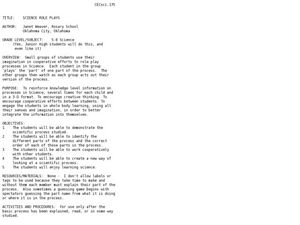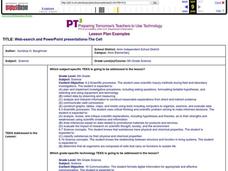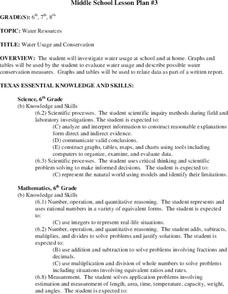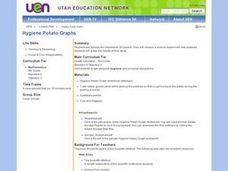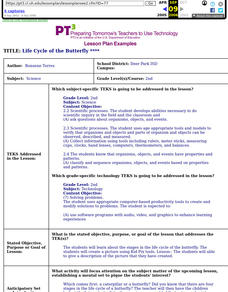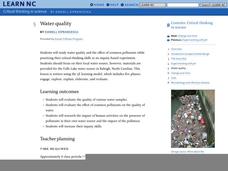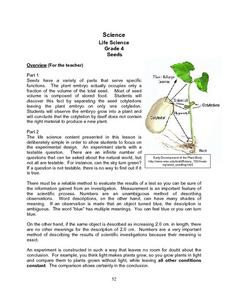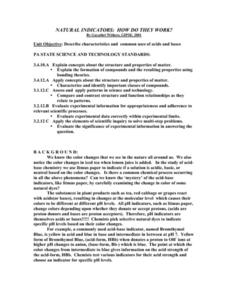Curated OER
Science Experiments - The Low-down
Third graders discover the process thinking about science experiments, and why they are important. They work in small groups using incline planes and a small toy car to design one scientific question that can be answered through...
Curated OER
Thinking About Science and the Environment
Learners read 3 or 4 Science articles and complete a chart. In this scientific thought concept lesson plan, students play a game using their chart to reinforce their ideas and concepts. Learners make a list of the bigger...
Curated OER
Science Role Plays
Learners use their imagination in cooperative efforts to role play processes in Science. Each student in the group 'plays' the 'part' of one part of the process. The other groups then watch as each group acts out their version of the...
Curated OER
Web-search And PowerPoint Presentations-The Cell
Sixth graders create a PowerPoint presentation using information that they have compiled from their web search and rubric web sites, text and other applicable references. They work in pairs to complete these searches and projects.
Curated OER
Let There Be Light
Fifth graders explore electricity. In this electricity lesson, 5th graders experiment with open and closed circuits. Students determine how to properly connect a battery and bulb to illuminate the bulb.
Curated OER
Scientific Method
Students explore the scientific method. For this scientific method lesson, students use information gathered from a "Seed Dispersal" lab done previously to complete a worksheet listing the steps of the scientific method.
Curated OER
Water Usage and Conservation
Learners investigate water usage at school and at home. They use graphs and tables to evaluate water usage. Students describe possible water conservation measures. They use graphs and tables to relate data as part of a written report.
Curated OER
Hygiene Potato Graphs
Fifth graders discuss the importance of proper hygiene. After watching their teacher peel potatoes, they discuss why she was wearing rubber gloves. They demonstrate how to wash their hands properly and why one should never touch...
Curated OER
Floating Soap
Students explore the density of soap. In this science lesson, students conduct an experiment to find which types of soap will float. Students make a hypothesis and record their observations.
Curated OER
"Publication" of Scientific Papers And Posters
Students create and display a scientific poster in the same format that scientists use at a research symposium. They compile data and make conclusions about the classification of the Arizona Hedgehog Cactus as an endangered species. ...
Curated OER
Don't Just Do It - Talk About It!
Students investigate a scientific problem while documenting their research with a video camera. In this scientific method lesson, students hypothesize over a science question and conduct an investigation to find an answer....
Curated OER
Life Cycle of the Butterfly
Second graders investigate the stages in the life cycle of the butterfly. They create a picture using Kid Pix tools. They give a description of the picture that they have created.
Curated OER
Red, Green, and Blue Mystery Liquids! Hypothesis or Inference?
Eighth graders are actively involved in the scientific method and inquiry as they form quick hypotheses based upon a teacher set of mystery liquids. They determine the need to make additional observations of the liquids.
Curated OER
Click, Clack, Moo: Electric Blanket Science
Young scholars read Click, Clack, Moo: Cows That Type by Doreen Cronin and discuss the similarities and differences between electric blankets and regular blankets. They brainstorm a list of reasons why the farm animals wanted electric...
Curated OER
The Characteristics of Living Things
Eighth graders explore the characteristics of living things. In this living things lesson plan, 8th graders review as a class the cell theory and the characteristics of living things. They answer questions about how to determine if...
Curated OER
Red Mangroves Of Southern Florida
Students engage in a unit plan to examine the ecological background for the Mangroves of southern Florida. They conduct research using print and computer technology sources. They use the information in a number of other extension...
Curated OER
Lesson Plan: The Cell- A Historical Perspective
Students discover the impact the invention of the microscope had on scientific discovery as well as the concept of spontaneous generation and the cell theory. Students examine these scientific concepts through a WebQuest and by viewing a...
Curated OER
Results and Conclusions
Fourth graders practice using the scientific method. In this results and conclusions lesson plan, 4th graders review data collected, create a graph of their data and make their final conclusions about the information collected.
Curated OER
Water Quality
Students analyze water quality and turbidity of collected samples. In this physics lesson, students conduct tests to identify the suspended particles in the samples. They explain how human activities affect water quality.
Curated OER
Take A Meal Worm To Lunch
Seventh graders, using a magnifying glass, observe mealworms in a cup.
Curated OER
Life Science - Seeds
Fourth graders participate in a scientific experiment involving growing lima beans. Students plot information gathered on included charts and graphs. Students use the steps of the scientific method throughout this experiment.
Curated OER
Will There be Enough Water?
Students investigate water usage, water available, and water demand historically in the local area. They use projections of water usage, availability and demand up to the year 2050. Students use graphs to relate as well as compare and...
Curated OER
Water - Planning for the Future
Learners explore and examine the increases and/or decreases for water user groups: irrigation, municipal, manufacturing, steam electric power generation cooling, livestock, and mining. They utilize percentage changes during their...
Curated OER
Natural Indicators: How Do They Work?
Students describe characteristics and common uses of acids and bases. They describe the role of natural indicators in the chemistry of acids and bases after testing and making observations on a variety of plant extracts. Students observe...
Other popular searches
- Scientific Process Skills
- The Scientific Process
- Scientific Process Observe
- Scientific Process Food
- Scientific Process Bridges
- Scientific Process Measure
- Scientific Process Lab
- Scientific Process Vitamin C
- Science Scientific Process




